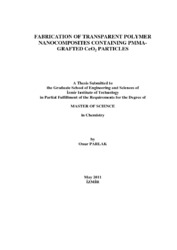Please use this identifier to cite or link to this item:
https://hdl.handle.net/11147/3143Full metadata record
| DC Field | Value | Language |
|---|---|---|
| dc.contributor.advisor | Demir, Mustafa Muammer | en |
| dc.contributor.author | Parlak, Onur | - |
| dc.date.accessioned | 2014-07-22T13:50:57Z | - |
| dc.date.available | 2014-07-22T13:50:57Z | - |
| dc.date.issued | 2011 | en |
| dc.identifier.uri | http://hdl.handle.net/11147/3143 | - |
| dc.description | Thesis (Master)--Izmir Institute of Technology, Chemical Engineering, Izmir, 2011 | en |
| dc.description | Includes bibliographical references (leaves: 31-33) | en |
| dc.description | Text in English; Abstract: Turkish and English | en |
| dc.description | viii, 33 leaves | en |
| dc.description.abstract | The composite materials prepared by transparent polymer and nanosized particles possess promising future in optical design and applications since their controllable optical properties. In this study, transparent/translucent composite films based on polystyrene (PS) and poly(methyl methacrylate) (PMMA)-grafted CeO2 nanoparticles were prepared. CeO2 nanoparticles were precipitated from Ce(NO3)3·6H2O and urea in dimethyl formamide at 120°C. The surface of the nanoparticles was modified with a polymerizable surfactant, 3-methacyloxypropyltrimethoxy silane (MPS) in situ at 0°C. The size of the particles was fixed to 18 nm in diameter. The particles were dispersed into a mixture of MMA:toluene solution. The free radical solution polymerization was carried out in situ at 60°C using benzoyl peroxide (BPO) as initiator. A PMMA layer is formed around CeO2 nanoparticles. The thickness of the shell ranged from 9 to 84 nm was controlled by the amount of BPO using 6 and 0.5 wt %, respectively with respect to monomer. The layer thickness was found to be inversely proportional with the amount of initiator. The resulting PMMA-grafted CeO2 particles were blended with PS in tetrahydrofuran and the solution was spin-coat on a glass slide. CeO2 content in the composite films was fixed to 5.5 wt %. The transmission of the films was examined by UV-vis spectroscopy. The transmission of the PS composite prepared by neat CeO2 particles was 71 %. It was increased to 85 % when the composite prepared with PMMA-grafted CeO2 particles whose PMMA thickness is 9 nm. We believe that the achievement in transparency is most probably due to the reduction in refractive index mismatch between CeO2 particles and PS matrix using PMMA layer at interface. | en |
| dc.language.iso | en | en_US |
| dc.publisher | Izmir Institute of Technology | en |
| dc.rights | info:eu-repo/semantics/openAccess | en_US |
| dc.subject.lcsh | Polymers | en |
| dc.subject.lcsh | Nanocomposites (Materials) | en |
| dc.title | Fabrication of transparent polymer nanocomposites containing pmma-grafted CeO2 particles | en_US |
| dc.type | Master Thesis | en_US |
| dc.institutionauthor | Parlak, Onur | - |
| dc.department | Thesis (Master)--İzmir Institute of Technology, Chemical Engineering | en_US |
| dc.relation.publicationcategory | Tez | en_US |
| item.languageiso639-1 | en | - |
| item.fulltext | With Fulltext | - |
| item.openairecristype | http://purl.org/coar/resource_type/c_18cf | - |
| item.openairetype | Master Thesis | - |
| item.grantfulltext | open | - |
| item.cerifentitytype | Publications | - |
| Appears in Collections: | Master Degree / Yüksek Lisans Tezleri | |
Files in This Item:
| File | Description | Size | Format | |
|---|---|---|---|---|
| T000952.pdf | MasterThesis | 1.41 MB | Adobe PDF |  View/Open |
CORE Recommender
Page view(s)
120
checked on Jul 22, 2024
Download(s)
50
checked on Jul 22, 2024
Google ScholarTM
Check
Items in GCRIS Repository are protected by copyright, with all rights reserved, unless otherwise indicated.